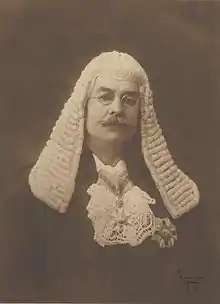Richard Chaffey Baker
Sir Richard Chaffey Baker KCMG (22 June 1842 – 18 March 1911) was an Australian politician. A barrister by trade, he embarked on a successful career in South Australian colonial politics, serving as Attorney-General of South Australia from 1870 to 1871 and President of the South Australian Legislative Council from 1893 to 1901 before switching to federal politics after federation. He served as the inaugural President of the Australian Senate from 1901 to 1906. A noted federalist, he was the son of one-time Premier of South Australia John Baker.
Sir Richard Chaffey Baker KCMG | |
|---|---|
 | |
| 1st President of the Australian Senate | |
| In office 9 May 1901 – 31 December 1906 | |
| Succeeded by | Albert Gould |
| Senator for South Australia | |
| In office 30 March 1901 – 31 December 1906 | |
| Personal details | |
| Born | 22 June 1842 North Adelaide, Colony of South Australia |
| Died | 18 March 1911 (aged 68) Norton Summit, South Australia |
| Nationality | Australian |
| Political party | Free Trade Party |
| Spouse(s) | Katherine Colley
(m. 1865–1908) |
| Alma mater | University of Cambridge |
| Occupation | Barrister |
He was an early proponent of an Australian republic.[1]
Early life
Baker was born in Adelaide, but returned to his family home of England to study at Eton College and Cambridge University. He was an oarsman in his youth and maintained a keen interest in cricket and horse racing. He graduated with a B.A. in 1864. He was called to the bar in June 1864.
Career
.png.webp)
Baker began developing a successful career as a barrister, but in 1868, at the age of 26, decided to stand for the state lower house of parliament, the House of Assembly, in the seat of Barossa. The campaign was successful, as he topped the poll, and thus took one of the two Barossa seats in the House of Assembly.
Baker earned an M.A. in 1870, and was appointed as Attorney-General in the third ministry of John Hart in May 1870, but returned to the backbenches in July 1871 in order to manage the affairs of his ailing father, and did not recontest his seat at the election late that year. Two years later, Baker visited England, and on his return in early 1875, he declined an offer to serve in the cabinet of Sir Arthur Blyth. He nevertheless recontested his old seat of Barossa, but was defeated. Two years later, Baker chose to instead contest a seat in the Legislative Council, and was successful. He held his seat until federation, serving a twelve-month stint as education minister in the Colton ministry in 1884–1885, and serving as President of the Legislative Council from 1893 until 1901. He founded the National Defence League in 1891 as an immediate response to the perceived threat from the Labor Party.
.jpg.webp)
Baker took a strong interest in the proposed federation of the Australian colonies in the 1880s and 1890s, and prepared A Manual of Reference to Authorities for the Use of the Members of the Sydney Constitutional Convention, which was published early in 1891 and distributed at the convention of that year. It influenced to some extent the first draft of the Constitution of Australia, which was drawn up as a result of the 1891 convention. Baker continued his involvement throughout the decade, and was elected as a representative of South Australia at the 1897 convention, where he served as chairman of committees and as a member of the constitutional committee.
With the onset of federation in 1901, Baker left his post as President of the Legislative Council and chose instead to run for the Australian Senate as a Free Trade Party candidate. He was successful in this move, and when parliament met, was elected as the first President of the Australian Senate. He was re-elected in 1904, and retired from politics in 1906.
Personal life
On 23 December 1865 he married Katherine Edith Colley (c. 1845–1908), who predeceased him and was survived by two sons (J. R. Baker LLD and R. C. Baker) and a daughter (Miss Edith Baker).[2] Katherine was a daughter of R. B. Colley, first mayor of Glenelg.
He was for many years chairman of the jockey club at Morphettville. He had large pastoral interests and was involved in the development of copper mining in the state. He was created a Companion of the Order of St Michael and St George (CMG) in 1886 and was knighted KCMG in 1895.
References
- McKenna, M (November 1997). "The Constitution Makers" (PDF). Papers on Parliament. p. 51. Retrieved 20 May 2019.
- "Sir Richard Baker". The Register. Adelaide: National Library of Australia. 11 December 1906. p. 6. Retrieved 25 April 2012.
Further reading
- "Baker, Sir Richard Chaffey (1841–1911)". Australian Dictionary of Biography. Melbourne University Press. ISSN 1833-7538 – via National Centre of Biography, Australian National University.
- Baker, Richard Chaffey (1891). A Manual Of Reference To Authorities For The Use Of The Members Of The National Australasian Convention Which Will Assemble At Sydney On March 2, 1891 For The Purpose Of Drafting A Constitution For The Dominion of Australia (PDF). Adelaide: W.K. Thomas & Co.
| Parliament of Australia | ||
|---|---|---|
| New title | President of the Australian Senate 1901–1906 |
Succeeded by Albert Gould |